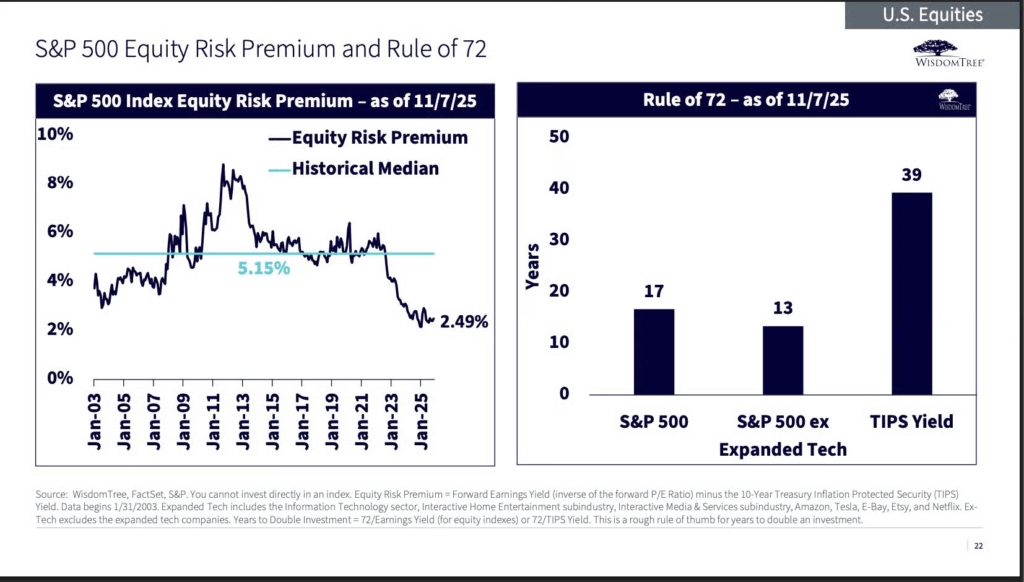1. Healthcare Stocks Rising…PPH Healthcare ETF Positive Yesterday vs. Nasdaq -2%

Bloomberg
2. The Counter Argument to My Negative Equity Risk Premium Charts from Yesterday
Equity risk premium. “These negative risk premium charts circulating again. Reminder: stocks are real assets: EPS, Divs demonstrated they [grow] with inflation over time. Earnings Yields vs TIPs are the right comp. Risks premiums roughly 1/2 last 20 yrs but stocks still better than bonds. Rule of 72 says time to double purchasing power: 39 years in TIPS, 17 years in S&P 500.”

Jeremy Schwartz
3. Bitcoin IBIT Below 50day and 200day

StockCharts
4. So I asked Perplexity About Past Historical Example of Bitcoin Below Moving Averages

Perplexity
5. One-Year After Bearish Closes ?

Perplexity
6. Ethereum Holding Above 200-Day

StockCharts
7. Bitcoin Treasury Firms -30-50%

Sherwood
8. Mag 7 vs. Country Market Caps…3 American Companies are Larger than Every Country Ex-Japan

Charlie Bilello
9. Streaming Inflation
Wolf Street Companies have spent billions of dollars buying sports programming, and they have shuffled programming around, and some have stripped some programming from basic streaming services. So prices alone may not reflect the whole picture.
Since 2019, subscriptions have soared, according to the WSJ:
- Disney+ +172%
- Apple TV +160%
- Peacock +120%
- Hulu +58%
- Paramount+ +40%
- Netflix +38%
- HBO Max +23%
https://wolfstreet.com/2025/11/12/inflation-rages-in-streaming-services/
10. Listening to music most days could guard against dementia, study suggests
Story by Maggie Penman-Washington Post
Listening to music most days could guard against dementia, study suggests© Maansi Srivastava/For The Washington Post
Regularly listening to music is linked to a lower risk of developing dementia, according to a new study.
In the study, published in October, researchers looked at data spanning a decade and involving more than 10,000 relatively healthy people, aged 70 and older, in Australia. People who listened to music most days slashed their risk of developing dementia by 39 percent compared with those who did not regularly listen to music, the study found.
“I have started myself listening to music more than I was,” Ryan said. “I would encourage people to be listening to music, because if it’s something they take pleasure from and it’s also stimulating their brain, why not?”
What happens to the brain when we listen to music
At Princeton University’s Music Cognition Lab, researchers have conducted studies looking at what happens to people’s brains when they listen to music. They’ve found that various parts of the brain are activated, including motor areas, sensory areas, the regions that process emotions and those involved in imagining or daydreaming. This could be the key to what makes music powerful for boosting brain health.
“One of the things that seems to be really important is just getting all those areas to talk to each other in meaningful ways,” said Elizabeth Margulis, director of the lab and a trained pianist who wasn’t involved in this new study. “That’s something music is exceptionally good at doing.”
Margulis pointed out that the study’s finding applies to listening to music as well as playing it. There was slightly less benefit associated with regularly playing music, with a 35 percent reduction in the risk of dementia, though the researchers suspect that’s because it’s a smaller group of people than those who regularly listen to music.
A takeaway is you don’t need to learn an instrument to benefit from engaging with music, though research has shown that taking music lessons can increase gray matter in the brain, even for people who aren’t particularly skilled.
Music also has a transportive quality, Margulis said. If you listen to a song that you first heard during a certain time of life, you may find yourself transported back to that time, especially with the music you listened to in adolescence.
“That tends to be the music that people remember best and have the most memories associated with,” Margulis said. She added that adolescence often is the time when people are defining themselves, which gives that music added meaning.
This can even be seen in people who are experiencing cognitive decline or diseases such as Alzheimer’s.
“They may not even recognize themselves in a mirror, they don’t know where they are or how they got there, but you put on a song from when they were 14, and they reconnect with that self they had lost,” said neuroscientist and musician Daniel Levitin, who also wasn’t involved in the new research.
Anecdotally, Margulis said, the effect seems to remain for a while even after they listen to the music.
“They’re a little more present, a little more able to interact,” Margulis said.
Music as medicine
Levitin has written a new book, “I Heard There Was a Secret Chord: Music as Medicine,” bringing together research about how music can be used as therapy for things including depression, pain and neurological disorders such as Parkinson’s.
“Listening to music is neuroprotective,” said Levitin, explaining that it builds resiliency and protects the brain by wiring new neural pathways. “It’s a myth that you don’t grow new neurons, and throughout the lifespan, you’re growing new pathways.”
Levitin added that while listening to music from the past can bring back memories and provide comfort, there is also a benefit to listening to new music and challenging yourself. He also encourages people to play music.
“You can start playing an instrument at any age, and you don’t need to be Herbie Hancock,” Levitin said. He recalled giving his grandmother a keyboard for her 80th birthday and watching her practice almost every day until she died at 97. Levitin said for him, playing music brings an immersive joy.
“If I’m lucky, I disappear, and the music plays me,” he said.
But he emphasized that just being around music — whether that’s listening or playing it — shows benefits. And it’s something pretty much everyone has access to.
“That’s the lovely thing,” Margulis said, on how accessible music is to everyone.